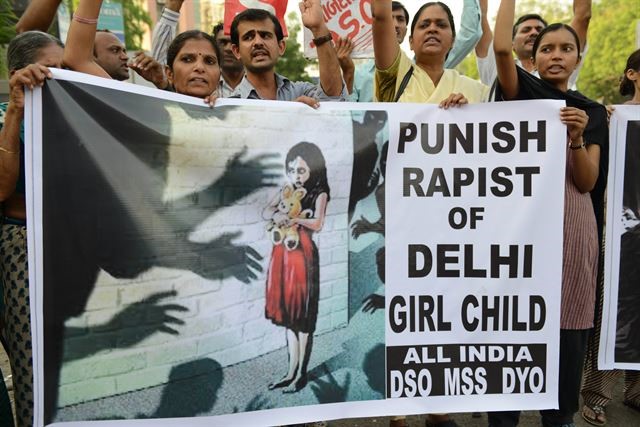 |
||
| ▲ They're struggling to be punished rapist of girl child. | ||
In India, sexual assault against women is an all too common occurrence. Women and girls are not respected and this applies to Indian women and visitors from overseas. For instance, a Korean female traveler was sexually assaulted during her journey through India.
On April 19, a 14 year old Indian girl went outside to use the toilet. During that time she was sexually assaulted by five men. When she reported the crime to her parents, they encouraged her to keep the incident a secret and told her not report it to the police. The girl lived in constant fear and shame for what happened to her. Her depression was too much to handle. Eventually she poured oil all over her body and set herself on fire. Now she is on life support with burns covering up to 70 percent of her body.
So why did the family want to hide the incident? Why do women not have their rights protected in India?
Female sexual assault is increasing in India as compared to 10 years ago, but why is the rate of reporting the crime still significantly low? Some say it is because of the ‘labeling effect’. People in small villages in India think that female sexual-assault occurs because of the victim’s behavior rather than the perpetrators. Also, Indian society often blames the victim for disgracing her family. Many victims suffer under these circumstances and they feel they have no choice but to take their own lives to end their misery.
Currently, India has less women than men with a ratio of 94 to 100. Men are well fed and cared for by their parents, while women are often killed as a result of parental abuse and discrimination by men. As a result, while the birth ratio is relatively close, the percentage of males and females in the population is vastly different in that there are more men than women.
Gender discrimination in India is well known all around world. India is ranked 132 of 142 countries in terms of gender equality. So why does India have the perception that women are somehow less valuable than men and that discrimination of women isn’t really important?
In Hindu society women don’t have the right to inherit property and they are often deemed a possession of men. This concept is difficult to change in rural societies. After the 1900s, there were many endeavors to increase the social participation of women and protect women’s rights especially in their right to equality of education. However, gender discrimination still exists in contemporary Indian society.
Women have launched demonstrations to protect their rights and have managed to bring about a few changes in gender equality. In 1998, the Indian government created a bill that guaranteed women a third of the seats in Parliament. In addition, these demonstrations led to amending the laws regarding sexual-assault by increasing penalties.
The International community is also doing a lot of things to protect the rights of women. For example, on March 8, there is an International Women’s Day. It is a day where people around the globe recognize the role of women in peace and development and urge support for the termination of discrimination and for a women’s right to fair participation in society.
It was just three years ago when the first demonstrations took place to protest rape in India. Women who were sexually assaulted had no voice to protest because they had few human rights protected and an atmosphere of victim blaming was rampant.
According to the Indian government, 507 cases of sexual assault occurred in 2010, 572 cases in 2011, 635 cases in 2012 in New Delhi. Sonya Peirera, a female Indian writer reported in The New York Times that, while 600 cases were filed with police in 2013 in Delhi only, there was only one case where the perpetrator was convicted. She states that the main problem is that many sex crimes take several years to conclude. She added that Indian culture views the victims of sexual assault as tainted. Nobody wants to marry victims of rape and stated that Indian society needs to get rid of the solution where the victim is forced to marry the perpetrator.
The stories in the media of violence against women in India are proof enough that more needs to be done to protect the rights of Indian women. Because it is a cultural issue, the problem and their approach to dealing with it will not change overnight. Instead it will require many social uprisings, coming from different social stratums, to raise awareness of the problem and recognize that sexual violence is a crime that cannot be tolerated and will instead be punished.
Lee Ji-seon, Lee Da-hye dkherald@hanmail.net

![[Campus Magnifier] Let's Surf the Library!](/news/photo/202404/12496_1765_4143.jpg) [Campus Magnifier] Let's Surf the Library!
[Campus Magnifier] Let's Surf the Library!
![[Campus Magnifier] Let's Surf the Library!](/news/thumbnail/202404/12496_1765_4143_v150.jpg)





